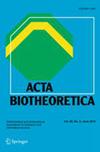The Metaphysics of Causation in Biological Mechanisms: A Case of the Genetic Switch in Lambda Phage
Abstract
The emphasis on the organization of entities and their activities and interactions has been labeled one of the most distinct contributions of mechanistic philosophy. In this paper I discuss the manner in which the organization of entities and their activities and interactions participates in bringing about phenomena. I present a well-known example from molecular biology—the functioning of the genetic switch in phage lambda—and discuss Marco J. Nathan’s notion of causation by concentration. Nathan introduces causation by concentration to account for the irreducible causal role that the concentration ratio between two kinds of proteins possesses in the genetic switch mechanism in phage lambda. I discuss what the irreducibility of this causal role amounts to and provide a mechanistic interpretation of Nathan’s causation by concentration; that is, I explain this irreducible causal role as one organizational feature of this mechanism. The paper concludes that biological mechanisms need a causal pluralist framework [similar to Glennan’s account in (2009), (2010) and (2017) but slightly modified] where organizational features such as the concentration ratio have a causally relevant role, yet all the causally productive relations occur at the level of entities or individuals.

 求助内容:
求助内容: 应助结果提醒方式:
应助结果提醒方式:


